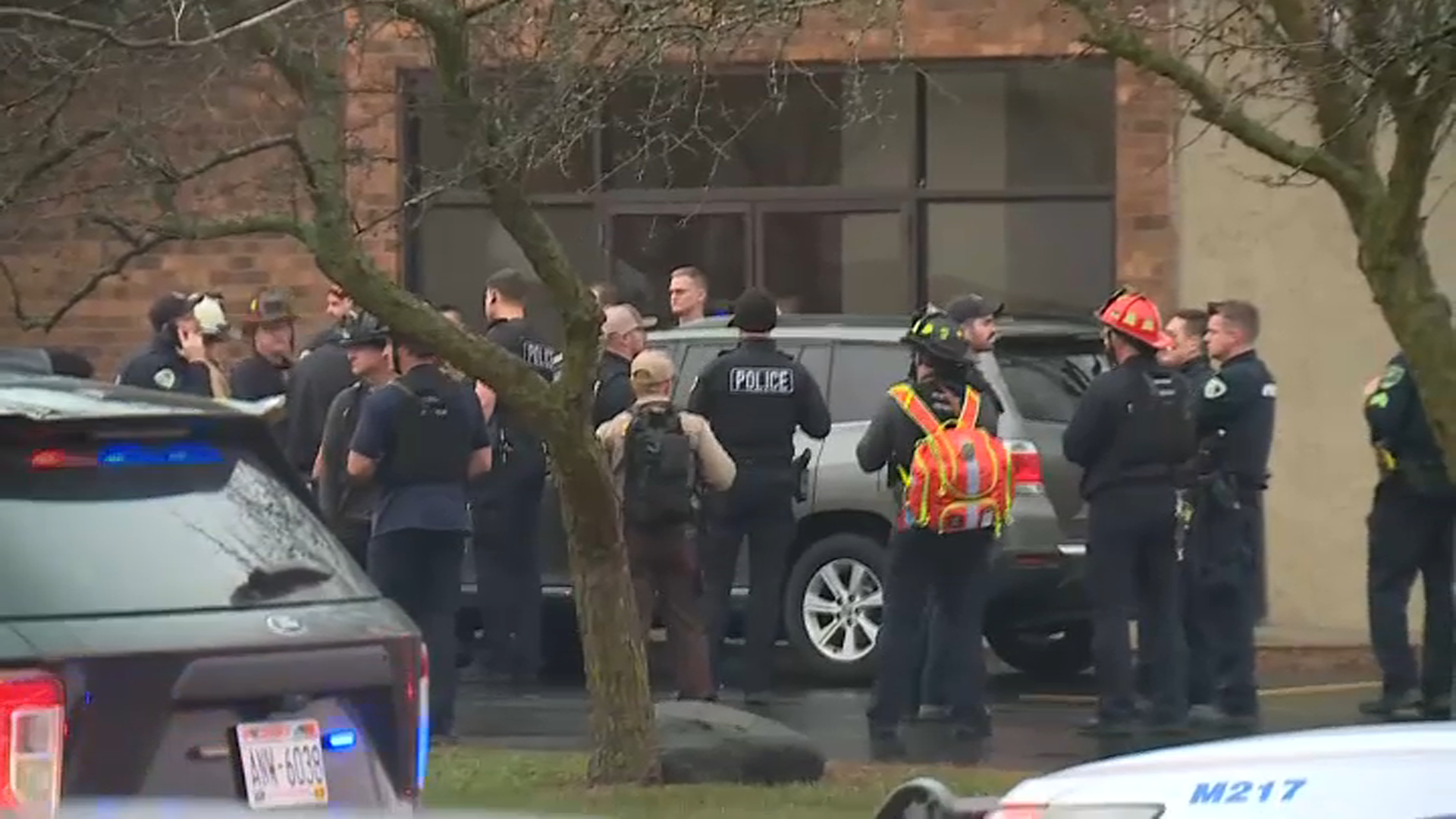
This article was published as part of a Telemundo Chicago-NBC Chicago collaboration with DePaul University to amplify the work of Chicago student journalists.
A migrant family has started selling foods from their home country in the streets of downtown Chicago as a way to make money to be able to rent an apartment while they wait for work permits.
Daniela, a migrant mother of two from Venezuela who did not wish to disclose her last name fearing repercussions, and her family, are selling arepas and other traditional dishes on one busy street corner.
She said her best selling dish is arepas, which are made from ground maize dough shaped into rounds and stuffed with meat and other fillings. But she also sells a variety of other dishes throughout the day.
Most of her clients, she said, are other migrants living in shelters that don’t have access to warm food or who crave the dish that reminds them of home.
“The pabellón is what I’m adding to the arepas. But typically, the pabellón dish consists of rice, black beans, shredded meat, fried plantains, and it includes eggs, cheese, and avocado,” she said in Spanish.
As she set up her food stand on a recent Thursday afternoon, she filled the streets with a spicy aroma and hungry crowds soon gathered around her to buy food from clear bins.
Local
Three to four times a week, Daniela wakes up early to prepare the food and packages it to be sold downtown. Her husband helps her to transport the food from her temporary apartment where she does all her cooking.
A Venezuelan migrant, who said his name was Kebin, is a frequent client of the recent street vendors selling traditional Venezuelan dishes. He said that the food stands help him feel connected to his home country.
Feeling out of the loop? We'll catch you up on the Chicago news you need to know. Sign up for the weekly> Chicago Catch-Up newsletter.
“It’s fantastic, to be honest. Since we are here in the United States everything is somewhat different, the culture is different, the food is different, and thanks to God [the vendors] are here, and we can buy food from our country,” Kebin said.
Like many other asylum seekers, he did not want to provide his full name after several reports of police dismantling the makeshift shops.
Daniela’s story is similar to the stories of many other migrants who have started to sell food in the streets as they await work permits. Recently, President Joe Biden granted temporary protected status to Venezuelan migrants and agreed to expedite the process for the distribution of work permits, but the timeline of when Daniela will get a permit is unclear.
Not having work authorization has made it challenging for Daniela’s family to settle into a new country, she said.
“I don’t work every day because sometimes the police bother us…I still don’t have a work permit, and I have two children – a baby who is about to turn 2 years old, and an 8-year-old boy. So, I have to work one way or another,” the mother said.
When she lived in Venezuela before migrating to the United States, Daniela was a student. She studied forensic sciences, criminal investigation and criminalistics with hopes of becoming an investigator. When she migrated to the United States and landed in Chicago, she began selling food to support her family.
Police, however, have made it difficult to run her business, she said.
“There are some who are calmer; they see that as long as there is no trouble or disorder, they don’t say anything,” Daniela said.
There are some officers who, without giving her a verbal warning, throw her merchandise in the trash, she recalled.
“I tell them no, because we are not dogs, we are not animals. I am not harming anyone, and I am not stealing,” she said.
The Office of Communication of the Chicago Police Department said in an email that they could not provide information on how officers respond to street vendors.
Vendors and advocates have pushed for a process to get licenses for immigrants selling food in the streets, according to Martin Unzueta, executive director and the founder of Chicago Community Workers' Rights.
But efforts have failed, pushing many to sell without a license. While some may be ticketed or apprehended from time to time, police often only respond if there are complaints, according to Unzueta, who has worked with vendors for decades.
Conservative leaders like Texas Gov. Gregg Abbott, have sent over 15,000 people seeking asylum to Chicago and other major cities that have ‘Sanctuary City’ status, according to city officials. The lack of resources for the number of people seeking asylum in Chicago has caused a humanitarian crisis and the city and some of its residents continue to find ways to adapt.
While some migrants have found temporary housing, most live in shelters or police stations, finding ways to make money to eventually find homes on their own.
Daniela said she plans to continue selling arepas to support her children. After all, she said, her family made the journey north for them.
Elizeth Arguelles, a community organizer who has been working since 2016, is the daughter of street vendors who began selling tamales when she first arrived in the country from Mexico, similarly to the new arrivals.
The first thing her parents did upon arriving in the United States in early 2000 was sell tamales on 26th Street, she said. When she was in high school, she began selling tamales with her mother.
“My mom got tired of working for someone else and not having some freedom, so she decided that she was going to start her own business. It was 15 years ago since she’s been making and selling her own tamales,” said Arguelles.
According to Arguelles, having the opportunity to sell their food gave her family, and many others like hers, a sense of freedom.
“I think that’s what selling food creates. It creates an opportunity for people to take their own destiny into their own hands instead of depending on a factory job or on the government,” she said. “It also provides a community. When you’re selling tamales or really any other food you really get to know your clients, your clients become almost like family. It really creates a sense of having something that matters and being a part of something.”
Street vendors are a vital part of the community in Chicago, Arguelles said. When she was 17, Arguelles was arrested for selling tamales to provide for her family. At the time, she recalled, her community stood together and went in solidarity with her mother to have her released.
Street vendors often find their strength and sense of safety through community, she said.
“Street vendors are like a light post. Once you have a street vendor on a corner, that creates a sense of safety for people… It also provides a connection to your culture,” she said. “It creates a sense that you are not far away from home. There’s a little piece you can taste in the food or you can hear when you talk to that vendor.”
Arguelles expressed the importance of Venezuelan migrants having the ability to sell their food and connect to their community.
“For Venezuelans, I think it’s important because it gives them autonomy and it gives them a piece of freedom that they might not be able to get. When you’re selling something you’re meeting other people, you’re getting connected to resources…It provides a sense of power, like ‘I can do this! I got this!’” Arguelles said.
Chicago is a great food city and has some of the best street food vendors, said Arguelles. She predicts that there will be an increase in Venezuelan street food vendors in Chicago and hopes to one day hear of success stories of vendors who have been able to build their businesses and employ other migrants from within the community.



